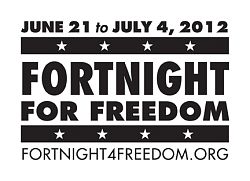Fortnight for Freedom
ATLANTA — In a time when freedom of religion is under attack throughout the world, the U.S. Conference of Catholic Bishops has called for a two-week period of prayer and education about the issue.
"Our main goals are one, to educate Catholics and the public at large about both the teaching of the Church on religious freedom, and the current and growing threats to that principle; and two, to encourage them then to pray for the protection of religious freedom, and to take action where they can, in their own lives, to advance that principle," said Archbishop William E. Lori, chairman of the Ad Hoc Committee for Religious Liberty, on June 13 during his opening remarks for the Domestic Religious Freedom Hour during the USCCB General Assembly.
While some national activities are planned during the Fortnight for Freedom – most notably the Mass at the Basilica of the Assumption in Baltimore on June 21 that will start the event and the concluding Mass on July 4 at the Basilica of the National Shrine in Washington, D.C., "it is mostly local, as a large and growing list of diocesan activities on the fortnight4freedom.org website attest," Archbishop Lori said.
The activities of more than 70 dioceses can be found on the website.
Rather than an occasion for civil disobedience, "the Fortnight is strictly about the issue of religious freedom at all levels of government here in the U.S., as well as abroad – it is not about parties, candidates, or elections, as some others have suggested," Archbishop Lori said.
The Fortnight for Freedom is in response to, among other things, the U.S. Department of Health and Human Services mandate that religious institutions provide health insurance that covers medical procedures that are contrary to the church’s tenets. The mandate exempts only those organizations that primarily employ and serve "persons who share the religious tenets of the organization."
Many Catholic schools don’t meet this definition, said John H. Garvey, Esq., president of The Catholic University of America, in his address to USCCB General Assembly. "Nor would organizations like Catholic hospitals and Catholic Charities that serve poor people without regard to their religious affiliation," he said, adding that HHS and other government agencies "would reduce religion to prayer and liturgical rituals – activities that occur inside church walls. There is no acknowledgment that faith has a place in the world – that it informs our education, that it performs corporal works of mercy. HHS has told us that no matter what message we preach about contraception, sterilization, and abortion, we must provide these ‘preventive services’ in our employee and student health plans, and ask the members of our community to subsidize them in the fees we charge."
Garvey gave six examples of how religious freedom in the United States has changed in recent years. One of those examples is that Catholic Charities in Washington, D.C. closed its 80-year-old foster care program after the City Council declined to provide an exemption to a law requiring them to pay spousal insurance benefits for same-sex couples and to place foster children with same-sex couples.
The loss of religious freedom in today’s world may be because fewer people regularly attend religious services or live by religious tenets, Garvey said. "Our society won’t care about religious freedom if it doesn’t care about God.... The best way to protect religious freedom might be to remind people that they should love God."
The Most Rev. John C. Wester, Bishop of Salt Lake City, said in an interview after the meeting that the bishops’ focus has been misunderstood by some.
"There are those in our society who would frame this completely differently," Bishop Wester said. "We are not talking about imposing our teachings on contraception on the country. We are not talking about contraception, we are talking about religious liberty. We’re talking about the government not defining what constitutes religion.... I realize that people will see this as political, and that’s not our desire. We are not a political party. We’re a church, and our concern is the Gospel of Jesus Christ, the sanctity of life, the liberties we enjoy in this country – for which we are deeply grateful – that allow us to worship and allow us to live in the public square by giving witness to our faith."
Web links
The text of Archbishop Lori’s opening remarks may be found online at www.usccb.org/issues-and-action/religious-liberty/opening-remarks-for-domestic-religious-freedom.cfm
"Religious Freedom and the Love of God," by John H. Garvey, Esq. is online at www.usccb.org/issues-and-action/religious-liberty/religious-freedom-and-the-love-of-god-garvey-address.cfm.
Local activities:
Novena — June 22 - June 29 from 3 - 8:30 p.m., the Carmelite Monastery, 5714 Holladay Blvd., SLC. This novena for the intention of the Fortnight for Freedom is open to anyone who would like to join the sisters for Eucharistic adoration to pray for this special intention.
Divine Mercy Hour of Adoration — for religious freedom, Sunday, June 24, 3 p.m., St. James the Just Catholic Church, 495 North Harrison Blvd., Ogden. Open to the public.
© Copyright 2024 The Diocese of Salt Lake City. All rights reserved.


Stay Connected With Us